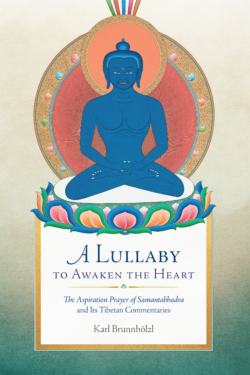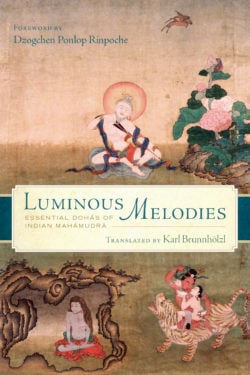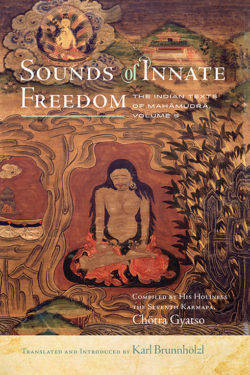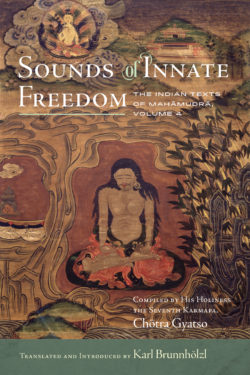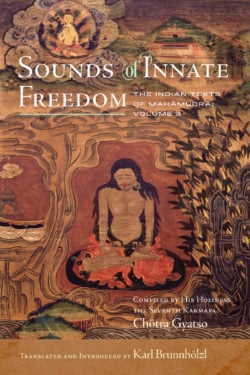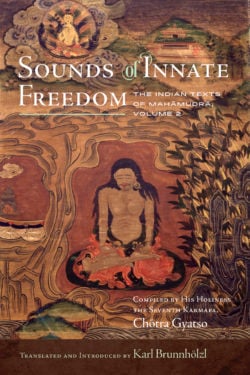Karl Brunnhölzl

Karl Brunnhölzl, MD, PhD, was originally trained as a physician. He received his systematic training in Tibetan language and Buddhist philosophy and practice at the Marpa Institute for Translators, founded by Khenpo Tsultrim Gyamtso Rinpoche, as well as the Nitartha Institute, founded by Dzogchen Ponlop Rinpoche. Since 1989 he has been a translator and interpreter of Tibetan and English. Karl Brunnhölzl is a senior teacher and translator in the Nalandabodhi community of Dzogchen Ponlop Rinpoche, as well as at Nitartha Institute. Living in Seattle, he is the author and translator of numerous texts. Currently, he is working on the Seventh Karmapa’s compilation of Indian Mahamudra works.
Books, Courses & Podcasts
A Lullaby to Awaken the Heart
The Aspiration Prayer of Samantabhadra, one of the most famous and often-recited Dzogchen texts, is at once an entreaty by the primordial buddha, Samantabhadra, that all sentient beings recognize the nature of their minds and thus become buddhas, and also a wake-up call by our own buddha nature itself. This monumental text outlines the profound view of Dzogchen in a nutshell and, at the same time, provides clear instructions on how to discover the wisdom of a buddha in the very midst of afflictions.
In this volume, Karl Brunnhölzl offers translations of three versions of the Aspiration Prayer and accompanies them with translations of the commentaries by Jigmé Lingpa, the Fifteenth Karmapa, and Tsültrim Sangpo. He offers further contextualization with his rich annotation and appendices, which include additional translation from Jigmé Lingpa, Longchenpa, and Patrul Rinpoche. This comprehensive, comprehensible book illuminates this profound text and greatly furthers our understanding of Dzogchen—and of our own nature.
Luminous Melodies
Presented here for the first time in English is a collection of dohās, or songs of realization, carefully and thoughtfully selected and translated from the large compendium the Indian Texts of the Mahāmudrā of Definitive Meaning, which was compiled by the Seventh Karmapa and drawn primarily from the Tengyur.
Beautiful, profound, and often outrageous, these verses were frequently composed spontaneously and thus have a moving sense of freedom, openness, and bliss. They range from summaries of the entire path of Mahāmudrā to pithy four-liners that point directly to the buddha within us. The authors include famous masters such as Saraha and Nāropā, ḍākinīs, kings, and also courtesans and cobblers—showing that realization is accessible to all of us, right here in our lives.
Sounds of Innate Freedom, Vol. 5
Sounds of Innate Freedom: The Indian Texts of Mahāmudrā are historic volumes containing many of the first English translations of classic mahāmudrā literature. The texts and songs in these volumes constitute the large compendium called The Indian Texts of the Mahāmudrā of Definitive Meaning, compiled by the Seventh Karmapa, Chötra Gyatso (1456–1539). The collection offers a brilliant window into the richness of the vast ocean of Indian Mahāmudrā texts cherished in all Tibetan lineages, particularly in the Kagyü tradition, giving us a clear view of the sources of one of the world’s great contemplative traditions.
This first volume in publication contains the majority of songs of realization, consisting of dohās (couplets), vajragītis (vajra songs), and caryāgītis (conduct songs), all lucidly expressing the inexpressible. These songs offer readers a feast of profound and powerful pith instructions uttered by numerous male and female mahasiddhas, yogīs, and ḍākinīs, often in the context of ritual gaṇacakras and initially kept in their secret treasury. Displaying a vast range of themes, styles, and metaphors, they all point to the single true nature of the mind—mahāmudrā—in inspiring ways and from different angles, using a dazzling array of skillful means to penetrate the sole vital point of buddhahood being found nowhere but within our own mind. Reading and singing these songs of mystical wonder, bliss, and ecstatic freedom, and contemplating their meaning in meditation, will open doors to spiritual experience for us today just as it has for countless practitioners in the past.
Click here to explore other volumes available in The Sounds of Innate Freedom series.
Sounds of Innate Freedom, Vol. 4
Sounds of Innate Freedom: The Indian Texts of Mahāmudrā are historic volumes containing many of the first English translations of classic mahamudra literature. The texts and songs in these volumes constitute the large compendium called The Indian Texts of the Mahāmudrā of Definitive Meaning, compiled by the Seventh Karmapa, Chötra Gyatso (1456–1539). The collection offers a brilliant window into the richness of the vast ocean of Indian mahamudra texts cherished in all Tibetan lineages, particularly in the Kagyü tradition, giving us a clear view of the sources of one of the world’s great contemplative traditions.
Besides the individual dohās (couplets), vajragītis (vajra songs), and caryāgītis (conduct songs) in this second volume in publication, the three extensive commentaries it contains brilliantly unravel enigmas and bring clarity not only to the specific songs they comment on but to many other, often cryptic, songs of realization in this collection. These expressive songs of the inexpressible offer readers a feast of profound and powerful pith instructions uttered by numerous male and female mahāsiddhas, yogis, and ḍākinīs, often in the context of ritual gaṇacakras and initially kept in their secret treasury. Displaying a vast range of themes, styles, and metaphors, they all point to the single true nature of the mind—mahāmudrā—in inspiring ways and from different angles, using a dazzling array of skillful means to penetrate the sole vital point of buddhahood being found nowhere but within our own mind. Reading and singing these songs of mystical wonder, bliss, and ecstatic freedom, and contemplating their meaning, will open doors to spiritual experience for us today just as it has for countless practitioners in the past.
Click here to explore other volumes available in The Sounds of Innate Freedom series.
Milarepa’s Kungfu
“This book is a treasure of subtle revelation.”
—Bonnie Nadzam, Lion’s Roar
The view is the wisdom of being empty
Meditation is luminosity without fixation
Conduct is a continual flow free of attachment
Fruition is nakedness bare of any stain
This is the first stanza of Milarepa’s Ultimate View, Meditation, Conduct, and Fruition: pith instructions originally sang to the great yogi Rechungpa, Milarepa’s disciple. These teachings are Milarepa’s direct offering to his disciple of his own profound realization, gained after many years of dedicated practice. Karl Brunnhölzl, acclaimed translator and senior teacher at the Nalandabodhi community of Dzogchen Ponlop Rinpoche, calls this hard-earned understanding “kungfu”: “Gong means ‘skillful work,’ ‘hard training,’ or ‘endeavor,’ and fu means ‘time spent…’ The term refers to Milarepa’s diligent and skillful training in the techniques to realize the nature of his mind and benefit countless sentient beings.”
Ultimate View, Meditation, Conduct, and Fruition is a work of remarkable depth and clarity. In just five verses, Milarepa gives incisive instructions for progressing and for avoiding pitfalls in the stages of practice:
-
- View: the basis or ground from which the proper meditation, conduct, and fruition of mahāmudrā can arise
- Meditation: the training in or the familiarization with that view
- Conduct: the natural outflow of having familiarized with the view in meditation
- Fruition: the final outcome of having fully assimilated and realized the view, whose essence is not different from it
Milarepa dedicates one verse to each stage, and Karl dedicates one chapter to each verse, weaving in wisdom from other Milarepa songs, comments by Khenpo Tsultrim Gyatso and from Karl’s own insight. Readers can thus fully immerse themselves in each point of Milarepa’s extraordinary teaching.
Sounds of Innate Freedom, Vol. 3
This is the third volume in an historic six-volume series containing many of the first English translations of the classic mahāmudrā literature compiled by the Seventh Karmapa. Sounds of Innate Freedom: The Indian Texts of Mahāmudrā are historic volumes containing many of the first English translations of classic mahamudra literature. The texts and songs in these volumes constitute the large compendium called The Indian Texts of the Mahāmudrā of Definitive Meaning, compiled by the Seventh Karmapa, Chötra Gyatso (1456–1539). The collection offers a brilliant window into the richness of the vast ocean of Indian mahamudra texts cherished in all Tibetan lineages, particularly in the Kagyü tradition, giving us a clear view of the sources of one of the world’s great contemplative traditions.
This third volume contains twenty-four texts, the bulk of which are dohās by Saraha and commentaries on them, as well as works by other renowned Indian Buddhist mahāsiddhas such as Nāropa, Kṛṣṇa, and Śākyaśrībhadra. The extensive commentaries brilliantly unravel enigmas and bring clarity to the songs they comment on as well as to many other songs of realization in the series. These expressive songs of the inexpressible offer readers a feast of profound and powerful pith instructions uttered by numerous male and female mahāsiddhas, yogīs, and ḍākinīs, often in the context of ritual gaṇacakras and initially kept in their secret treasury. Displaying a vast range of themes, styles, and metaphors, they all point to the single true nature of the mind—mahāmudrā—in inspiring ways and from different angles, using a dazzling array of skillful means to penetrate the sole vital point of buddhahood being found nowhere but within our own mind. Reading and singing these songs of mystical wonder, bliss, and ecstatic freedom, and contemplating their meaning, will open doors to spiritual experience for us today just as it has for countless practitioners in the past.
Click here to explore other volumes available in The Sounds of Innate Freedom series.
Sounds of Innate Freedom, Vol. 2
The second volume in a historic six-volume series containing many of the first English translations of the classic mahāmudrā literature compiled by the Seventh Karmapa.
Sounds of Innate Freedom: The Indian Texts of Mahāmudrā are historic volumes containing many of the first English translations of the classic mahāmudrā literature. The texts and songs in these volumes constitute the large compendium called The Indian Texts of the Mahāmudrā of Definitive Meaning, compiled by the Seventh Karmapa Chötra Gyatso (1456–1539). Translated, introduced, and annotated by Karl Brunnhölzl, acclaimed senior teacher at the Nalandabodhi community of Dzogchen Ponlop Rinpoche, the collection offers a brilliant window into the richness of the vast ocean of Indian mahāmudrā texts cherished in all Tibetan lineages, particularly in the Kagyü tradition, giving us a clear view of the sources of one of the world’s great contemplative traditions.
This volume 2 (thirty-four texts) contains two long-established sets of Mahāmudrā works: “The Sixfold Pith Cycle” and short texts of Maitrīpa’s “Twenty-Five Dharmas of Mental Nonengagement,” which present a blend of Madhyamaka, Mahāmudrā, and certain tantric principles, as well as two commentaries by Maitrīpa’s students. The vital focus of this volume is the accomplishment of true reality.
Click here to explore other volumes available in The Sounds of Innate Freedom series.

